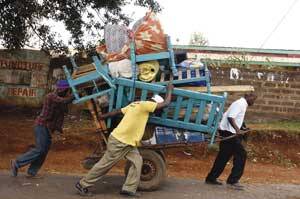Nearly two years after a controversial presidential election prompted widespread violence, Kenya remains a country on the brink of crisis, as government corruption and lack of accountability threaten to immerse the country once again in political and social chaos.
Over a thousand people died, and more than 10,000 were driven from their homes, following what many regard as a stolen election in late December 2007. Members of minority ethnic groups were burned inside churches, and alarms sounded that Kenya could become “another Rwanda,” descending into the moral abyss of genocide.
The international community responded with significant steps to protect the people of Kenya. Former U.N. Secretary General Kofi Annan led the effort, with support from African leaders, the United States and the European Union. The election adversaries ultimately agreed to form a “grand coalition” in the interests of national unity, with Mwai Kibaki remaining president and the opposition leader Raila Odinga becoming prime minister.
The intervention demonstrated that the international community can play a vital role in implementing the doctrine of the “responsibility to protect” (R2P). Formulated in the aftermath of the Rwanda genocide, R2P has since been ratified by the United Nations and endorsed by Pope Benedict XVI. It affirms that a government has the primary responsibility to protect its people from genocide, crimes against humanity and war crimes. If a government is unable or unwilling to offer this protection, the international community has a right and duty to step in.
Unfortunately, inaction by the Kenyan leadership has put the country on a path to conflict that could well include the human rights abuses R2P seeks to prevent. The government has almost no accountability to its citizens. For more than a decade, it has been conducting fruitless talks about the creation of more adequate constitutional structures, and has performed poorly amid a recent drought.
Meanwhile, an investigation into the 2007 post-election violence has stalled. The compromise mediated by Annan called for the president and the prime minister to establish a tribunal to probe the forces behind the violence. Yet plans for the tribunal were rejected by the Kenyan parliament in March, and by the cabinet in July. But key members of the cabinet proposed that the investigation should be turned over to a Truth, Justice and Reconciliation Commission, a move to reinforce the impunity that has long allowed criminals to retain political power in Kenya.
Even more cynically, President Kibaki recently reappointed Aaron Ringera as head of the Kenya Anti-Corruption Commission. Ringera has been at best incompetent in this position, and at worst protects or collaborates with corrupt individuals in the government. Many now believe that a full-fledged investigation by the International Criminal Court in The Hague is necessary. Indeed, the I.C.C. prosecutor, Luis Moreno-Ocampo, has indicated that he is preparing to move unless Kenya takes serious judicial steps very soon. Meanwhile, the United States has threatened sanctions if the Kenyan government does not act.
As Kenya moves to another election in 2012, international action remains crucial to prevent further violence. If the government of Kenya cannot be persuaded to exercise its responsibility to protect its own citizens, more direct action may be called for. Yet given the historical record of international tolerance for grave human rights abuses, as in Darfur today, forceful international intervention seems unlikely. In order to ensure the security of the people of Kenya, finding preventive steps short of intervention must remain an international priority.








